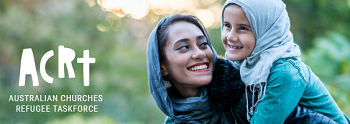Afghan refugee intake
While the government is keeping the humanitarian program capped at 13,750 — the same as the previous two years — it has announced extra places for Afghan nationals.
The recently released budget includes $665.9 million over the next four years for an additional 16,500 places for people fleeing from Afghanistan.
In January, the Immigration Minister Alex Hawke announced the government would allocate 15,000 visas over four years for Afghan nationals fleeing the Taliban — 10,000 within the humanitarian program and 5,000 within the family stream.
This means Australia will offer more than 30,000 refugee visas to Afghan nationals over the next four years.
Read: pdf MEDIA RELEASE Christian leaders welcome lift in Afghan refugee intake docx (131 KB)
NZ settlement announcement
New Zealand’s generous offer to resettle 450 refugees from Australia’s cruel offshore processing system was announced last week, finalising an agreement proposed almost a decade ago.
The places, offered to 150 refugees each year for three years, will make a life-changing difference to people who have endured nine years in our offshore system – much of that time in locked detention.
While the agreement does not apply to the 104 people left in Papua New Guinea abandoned by the Australian Government in December, UNHCR has brokered a separate arrangement with the NZ and PNG governments.
Read: Refugee Council of Australia welcomes NZ deal
Principles for Australian Refugee Policy- the Kaldor Centre
As voters prepare for a federal election, the Kaldor Centre’s updated Principles for Australian Refugee Policy offer an important, evidence-backed benchmark at a critical juncture.
These Principles show what Australia can do to respond to the crises of tomorrow and today, including the millions of people recently forced from their homes by the Taliban takeover in Afghanistan and Russia’s invasion of Ukraine.
As the Preface to the revised edition notes:
‘In Australia, extended lockdowns and border closures during COVID-19 meant that for the first time, many people had an insight into some of the deprivations that are hallmarks of displacement – the inability to cross borders lawfully, loss of liberty, confinement, separation from family and friends, and extreme uncertainty. But whereas for them, these measures were temporary, for many refugees and other displaced people, such limbo is permanent.
‘With Australia’s borders reopened, we now have a particular opportunity – indeed, responsibility – to rethink and reset Australia’s asylum policies, drawing on this newfound understanding.’
An approach that is humane and manageable is possible.
The Kaldor Centre Principles for Australian Refugee Policy explain the what, why and how, with examples of best practice from around the world.
Explore the Principles in summary and full form.
 Australian Churches Refugee Taskforce (ACRT) is an activity of the National Council of Churches in Australia (NCCA).
Australian Churches Refugee Taskforce (ACRT) is an activity of the National Council of Churches in Australia (NCCA).
We believe our faith calls us to welcome the stranger and care for the people who find themselves displaced, marginalised or homeless, and those in need of protection. We want to see a compassionate and generous response to welcoming refugees into Australia.









